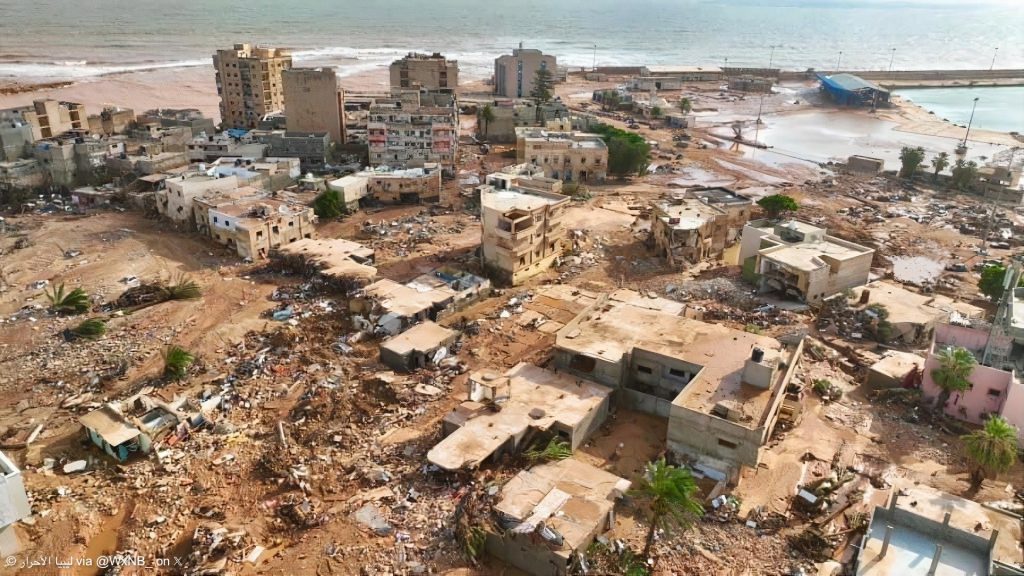The research sheds light on the alarming consequences of climate change in the vulnerable Mediterranean region, highlighting the urgent need for adaptation and mitigation strategies.
—
This summer’s deadly floods in the Mediterranean region, including Greece, Turkey, and Libya, were made between ten and 50 times more likely and intense by climate change, researchers found.
Published Tuesday by the World Weather Attribution, the new study found a clear link between climate change and this summer’s extreme rainfall events in the Mediterranean region. The research team analysed historical rainfall data, climate models, and socioeconomic factors to understand the complex dynamics at play and utilised advanced statistical methods to attribute the observed changes in rainfall patterns to human-induced climate change.
The findings of the study, which has not yet been peer-reviewed, indicate a clear link between climate change and the deadly floods in Greece, Bulgaria, Turkey, and Libya. The authors note that increased greenhouse gas emissions have intensified the hydrological cycle, leading to more frequent and intense rainfall events. These extreme downpours, coupled with factors such as population density, urbanisation, and inadequate infrastructure, have resulted in significant impacts on communities, ecosystems, and the economy.
Greece’s flooding, which researchers say is a 1-in-250-year event, was made up to 10 times more likely to occur and 40% more intense by anthropogenic climate change. As for Libya’s floods, a catastrophic natural events that typically occurs once every 300 to 600 years, researchers found that climate change made it up to 50 times more likely and up to 50% more intense compared to a 1.2C cooler climate.
Furthermore, the research highlights the disproportionate impacts of climate change on marginalised communities and vulnerable populations in the Mediterranean region. Socioeconomic factors, such as poverty, limited access to resources, and inadequate infrastructure, exacerbate the vulnerability of these communities, leaving them less equipped to cope with the consequences of extreme weather events. In the case of Libya, political instability and neglect of the nation’s infrastructure turned the extreme event into a humanitarian disaster.
You might also like: Europe Is the World’s Fastest-Warming Continent, WMO Finds
The study also identifies hotspots within the Mediterranean region that are particularly vulnerable to climate change-induced rainfall. These areas, including coastal cities and low-lying regions, experience a higher risk of flooding, landslides, and other related hazards. For this reason, researchers emphasise the importance of targeted adaptation strategies and improved resilience measures in these hotspots to mitigate the impacts of extreme rainfall events.
“The Mediterranean is a hotspot of climate-change-fuelled hazards,” said Friederike Otto, a climate scientist at Imperial College London and co-author of the report. “There is absolutely no doubt that reducing vulnerability and increasing resilience to all types of extreme weather is paramount for saving lives in the future.”
“[The study] reinforces our understanding that while climate change can be seen as the underlying cause of recent catastrophes, its impacts are exacerbated by landscape management that lacks adequate preventive measures,” Enrique Doblas, an ecologist and member of Mediterranean Experts on Climate Change and Environment who was not involved in the study, told The Guardian.
As the Mediterranean region continues to face the consequences of climate change, the study serves as a wake-up call for governments, organisations, and individuals to prioritise climate action. The findings underscore the interconnectedness between climate change, extreme rainfall, and vulnerability, emphasising the need for a comprehensive and integrated approach to address the challenges posed by a changing climate.
Featured image: ليبيا الأحرار/Twitter
You might also like: Earth Is Entering a ‘Danger Zone’ As Six Of Nine Planetary Boundaries Already Past Safe Limit, Scientists Find


















